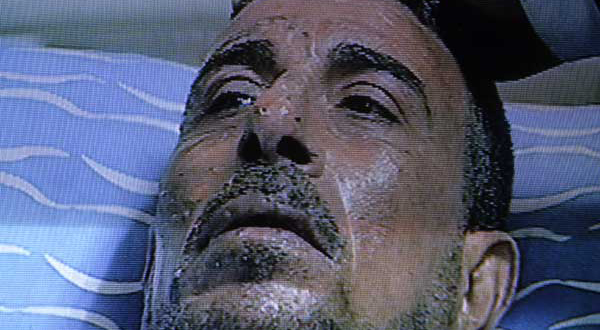 CAIRO: A 50-year old man reportedly set himself on fire Monday morning outside the People’s Assembly (PA) building in downtown Cairo.
CAIRO: A 50-year old man reportedly set himself on fire Monday morning outside the People’s Assembly (PA) building in downtown Cairo.
“At about 9 am I saw flames near the parliament. But I could not figure out how the situation was like from where I was standing,” an eye witness who works at a nearby store told Daily News Egypt on condition of anonymity.
“Then I saw the policemen who guard the PA around the man before an ambulance carried him away,” the eye witness added.
Abdo Abdel Moniem Kamal asked policemen guarding the parliament building to meet speaker Fathi Sorour, officials said. When they refused, Kamal stepped back, took out a bottle filled with petrol from his pocket, doused himself with the liquid and set himself alight.
The policemen and passing motorists rushed to him with fire extinguishers to put out the flames.
The officials spoke on condition of anonymity because they were not authorized to brief the media.
Security officials identified Kamal as an owner of a small restaurant from Qantara, an area close to the Suez Canal city of Ismailia east of Cairo. They said Kamal was protesting a government policy preventing restaurant owners from buying cheap subsidized bread to resell to their patrons.
Minister of Health Hatem El-Gabali visited Kamal in the morning. The prosecution interrogated him inside the hospital afterwards.
El-Gabali said Kamal torched himself because of an "administrative problem." The 50-year-old father of four had superficial wounds and would be out of hospital in 48 hours, MENA quoted him as saying.
Upper House speaker Safwat El-Sherif said the problem was personal and did not warrant a parliamentary debate.
"But at the same time, we must look into these kinds of problems, and if an administrative body failed to act correctly, it must be held accountable and the man should get his rights," El-Sherif said.
MENA said Kamal set fire to himself because he was refused extra coupons to buy subsidized bread for his restaurant.
In Ismailiya, governor Abdel-Geleel Fakharani said in a statement to reporters that Kamal had a history of mental problems and had been in and out of hospitals.
But Kamal friends denied this.
"You cannot say he had mental problems. You can say he had personal or emotional problems like most Egyptians do these days," Hamed Megahed said outside Cairo's Al-Mounira hospital where Abdelmoneim was being treated.
"He has a large family to look after. He has a mother, a wife, and four children," he said.
Later in the afternoon, official health ministry spokesman Abdel-Rahman Shahin told reporters at an ad hoc press conference that Kamal “arrived at the Al-Moniera public hospital at 9.20 am with burns ranging from 10 to 15 percent in intensity.”
“The initial medical report indicates that he suffers from superficial burns in his face, neck, hands and legs,” Shahin said. “The patient is in a stable condition; and he is expected to be discharged within 48 hours.”
Shahin added that Kamal will need to follow-up at the clinic afterwards.
Shahin declined to give any speculations about the reason behind the incident.
State Minister for Parliamentary Affairs Mufid Shehab, a ruling party stalwart, said it was "important not to jump to conclusions in these cases."
Despite rumors indicating that Kamal attempted to commit suicide due to the deteriorating economic conditions, Khalid Makeen, health minister’s advisor and a plastic surgeon ruled out this possibility of Kamal attempting
“In plastic surgery, we cannot conclude the cause of the burns. But after examining the patient, [I found out] that his burns are superficial, which forensically excludes likelihood that he wanted to kill himself,” Makeen told reporters.
“A person who aims to kill himself should have spilled gas on himself, which would eventually cause his death,” he added.
However, opposition leader Ayman Nour who managed to visit Kamal said that the latter attempted to commit suicide and that his burns are more severe than what was officially announced.
“I think his burns are not less than 30 percent in intensity,” Nour, also a lawyer, said.
“I tried to talk to him as a lawyer but I was not allowed to. But I heard him talking to the police about having a difficulty acquiring [subsidized bread] and failing to find a solution through the local municipality,” Nour added.
The hospital administration did not allow reporters to talk to the patient.
“We are not hiding [any] facts …. the incident is not worth all this [fuss],” Shahin said.
In Egypt, the law criminalizes attempting to commit suicide.
The incident follows a similar one in Tunisia where a 26-year old university-educated man set himself ablaze on Dec. 17 after the police confiscated his vegetable cart.
The Tunisian man later died of in the hospital, which sparked protests all over Tunisia that eventually overthrew the regime of President Zain El Abidine Ben Ali.
Similar incidents of self immolation were reported in Algeria and Mauritania this week.
"Are we seeing a new trend?" wrote Blake Hounshell, who covers the Middle East at foreignpolicy.com. "There is something horrifying and, in a way, moving about these suicide attempts. It's a shocking, desperate tactic that instantly attracts attention, revulsion, but also sympathy." –Additional reporting by agencies.



